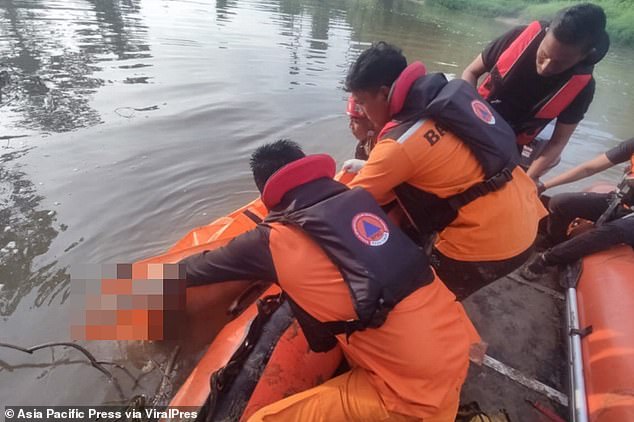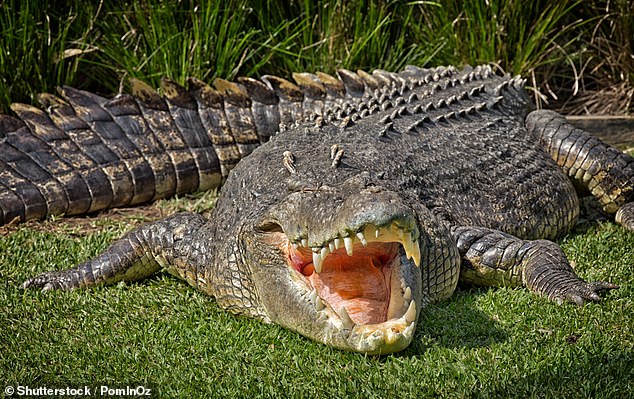Grandfather, 68, is torn in half by a crocodile and has his head eaten while washing himself in a river
A grandfather was brutally split in half and his head bitten off by a crocodile while he was washing himself in a river.
M Yunus, 68, from Aceh province, Indonesia, had told his wife Dimyam, 64, that he was going to bathe in the Peureulak River behind their house on Thursday.
But in a terrible twist, the grandfather still did not return after several hours. There were fears that he had drowned in the water.
When Dimyam went to the river to check on her husband, she found only his clothes and mobile phone on the grassy banks.
She ran back to her village and called the local police and her family for help, fearing the worst.
M Yunus, 68, from Indonesia, was eaten by a crocodile on Thursday after he told his wife he was going to bathe in a river behind their house

The remains of his body were collected by rescuers and taken home for burial, but his upper body, head and arms have not yet been found.
Iptu Andi Ananta Grilya Utama, Ranto Peureulak police chief, said in a statement: “The victim’s wife suspected that her husband had drowned and alerted her son who lives in Langsa.”
Emergency services, rescue teams and local volunteers searched the river but were unable to find the elderly man’s body.
The search ended on the morning of August 30, when staff from the East Aceh Regional Disaster Management Agency finally found Yunus’ body downstream, about a mile from where he had left his clothes.
He was reportedly stuck in a wooden branch and the entire upper part of his body was gone.
Authorities suspect he was attacked and devoured by a crocodile.
The remains of his body were collected and taken home for burial, but his upper body, head and arms have not yet been found.
They are convinced that the killer crocodile ate the rest of the grandfather’s body during the terrifying incident.
On August 31, farm workers found a huge dead crocodile along the riverbank, believed to be from Yunus’ murder.
It lay lifeless in the undergrowth on the edge of a palm oil plantation.
A shocked resident, Abdullah, said: “We thought it was the crocodile that had eaten Yunus so we cut open the bag but we found no human body parts.
‘People from Bhom Lama and Paya Meuligo villages are now worried and feel reluctant to carry out their usual activities around the river.’

Authorities believe Yunus was attacked and devoured by a crocodile (file photo)
The Indonesian archipelago is home to 14 species of crocodiles. There is a large population of extremely large and aggressive estuarine crocodiles that thrive in the region’s climate.
Conservationists believe that crocodiles are being pushed further inland, closer to villages, by overfishing, which has reduced the crocodiles’ natural food supply, combined with habitat loss due to coastal development into farms.
Because uneducated locals in developing countries still use rivers for bathing and primitive fishing, the deadly combination of factors has led to an increasing number of crocodile attacks.
This came after a grandmother in Indonesia was mauled to death by a 3.5-metre crocodile last month, with gruesome footage showing authorities pulling her body from the beast’s belly.
Halima Rahakbauw, 54, was washing pots in a river in the Maluku village of Wali. She had spent the morning searching for mussels when the reptile struck.
After seeing a sandal and part of a leg in the river, villagers reported the incident to the police. The police saw the crocodile eating the woman’s body and shot the woman dead.
In 2018, a mob in Indonesia’s easternmost region of Papua slaughtered nearly 300 crocodiles in revenge after a local man was killed by one of the reptiles.
In 2019, a scientist was dragged into his enclosure and killed by a huge captive crocodile on the island of Sulawesi.
